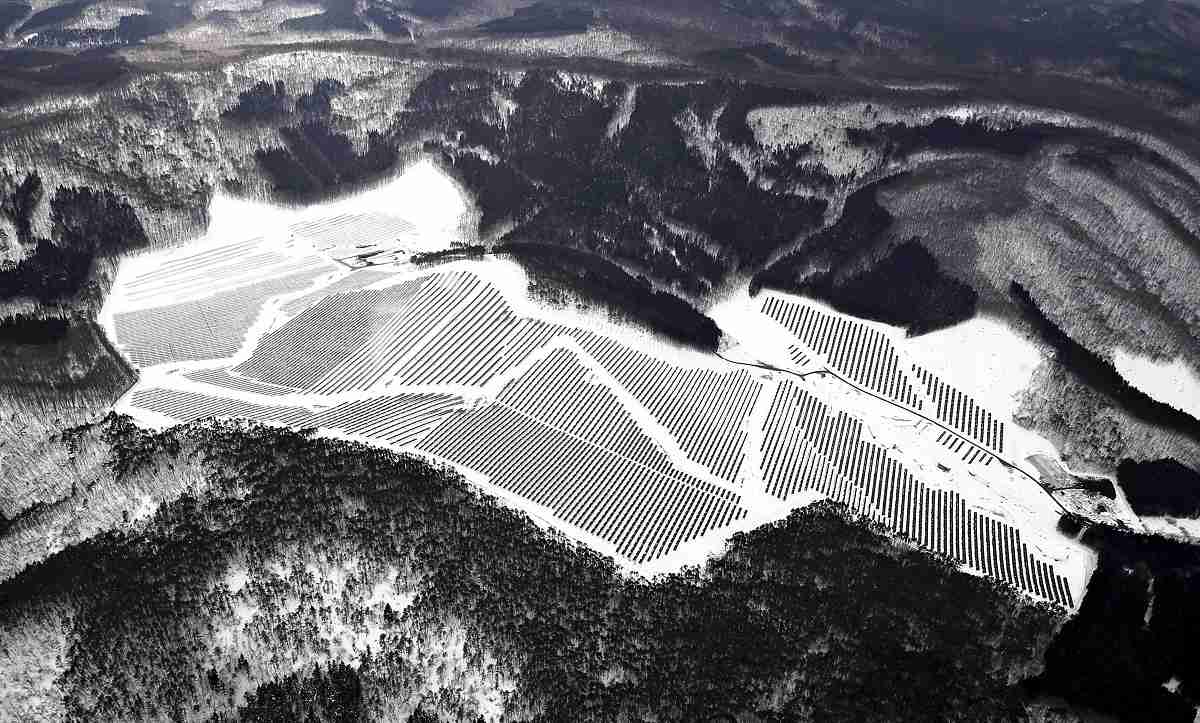New Japan System to Focus on Local Residents’ Consent when Building Solar Power Plants

A solar power plant is seen in Tono, Iwate Prefecture, on Feb. 6. The facility has caused a dispute with local residents because a nearby river has become muddied.
16:11 JST, February 21, 2021
Prompted by disputes over the impact of renewable energy plants, the Environment Ministry will introduce a new system in which local governments designate promotional zones for such facilities and help operators construct them with the consent of residents.
The ministry plans to submit a bill to revise the Law on Promotion of Global Warming Countermeasures to the current Diet session, aiming to launch the new system as early as fiscal 2022.
Under the feed-in tariff system that was launched in 2012, the electricity generated from renewable energy sources is purchased by utility companies at a price set by the government. The system has encouraged the construction of plants around the nation to generate renewable energy — most of them using solar power — but these facilities have also triggered numerous disputes with local residents, who complain that the felling of trees has caused such problems as ruined landscapes and greater risk of landslides.
Under the new system, municipalities will be required to designate zones for the promotion of renewable energy plants. Municipalities can then set points of consideration that operators in the designated zones have to observe, such as preventing noise pollution and harm to landscapes, promoting the employment of residents, and supplying electricity in the event of a disaster.
An operator will create a business plan based on these points. The plan will be examined at a council comprising such members as local residents and officials from the municipal, prefectural and central governments. An operator can officially submit its plan to the government only after it is approved at the council, so this approach is expected to reduce the number of disputes with local communities.
To build renewable energy plants, operators have to obtain permission based on various legislation and regulations, such as laws governing forests and hot springs, depending on the location of the construction site. Under the new system, municipalities will handle these procedures on behalf of businesses planning to operate in the promotion zones, thus helping them build their facilities more smoothly.
Local governments have faced various issues related to solar power plants, as many of them set up panels on huge plots of land. The Yomiuri Shimbun surveyed local governments from December to February, based on data from the nonprofit Institute for Sustainable Energy Policies and other entities, and found that at least 138 had enacted ordinances to regulate the construction of solar power generation plants. This number included the prefectural governments of Hyogo, Wakayama and Okayama.
When asked in a questionnaire sent by The Yomiuri Shimbun about the reasons for establishing such ordinances, 111 of the 138 local governments cited landscape issues, while more than 100 each cited preventing landslides and other disasters, protecting the natural environment, and opposition from local residents. Multiple answers were allowed for this question.
Of the 138 local governments, about 80%, or 108, had enacted their ordinances since 2018.
Seventy-six local governments require agreements or permission from governors or mayors when constructing plants, while 54 obligate operators to reserve funds for restoring construction sites to their previous state, or removing and disposing of equipment.
Thirty-seven local governments designate zones where plants cannot be constructed.
Top Articles in Politics
-

Japan PM Takaichi’s Cabinet Resigns en Masse
-

Sanae Takaichi Elected Prime Minister of Japan; Keeps All Cabinet Appointees from Previous Term
-

Japan’s Govt to Submit Road Map for Growth Strategy in March, PM Takaichi to Announce in Upcoming Policy Speech
-

LDP Wins Historic Landslide Victory
-

LDP Wins Landslide Victory, Secures Single-party Majority; Ruling Coalition with JIP Poised to Secure Over 300 seats (UPDATE 1)
JN ACCESS RANKING
-

Japan PM Takaichi’s Cabinet Resigns en Masse
-

Japan Institute to Use Domestic Commercial Optical Lattice Clock to Set Japan Standard Time
-

Israeli Ambassador to Japan Speaks about Japan’s Role in the Reconstruction of Gaza
-

Man Infected with Measles Reportedly Dined at Restaurant in Tokyo Station
-

Videos Plagiarized, Reposted with False Subtitles Claiming ‘Ryukyu Belongs to China’; Anti-China False Information Also Posted in Japan























